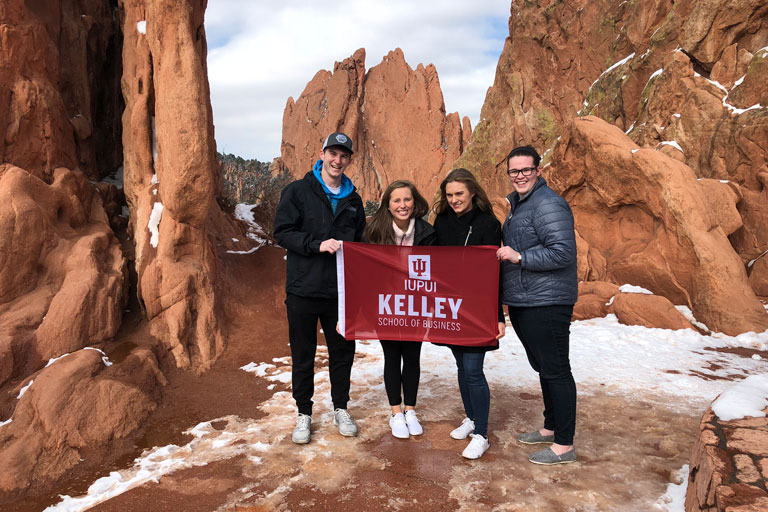By: Alyssa Kane, BS’21
A Kelley Honor student’s reflection on the National Character and Leadership Symposium
Leadership is one of the most important skills we will need as business professionals. If you’re a current Kelley, there is a good chance you’ve heard all your professors speak about leadership in some aspect. Yes, it is important to know how to balance a balance sheet or conduct a SWOT analysis, but what sets us apart as business professionals is our ability to conduct ourselves with integrity, discipline, respect, and leadership.
I recently had the opportunity to travel with three other Kelley Honors students to Colorado Springs for the National Character and Leadership Symposium (NCLS). We were hosted at the United States Airforce Academy where we enjoyed learning about the strict discipline of military life as we ate, roomed, and lived with our cadets. Over the course of the two-day conference, I heard captivating stories though provoking lectures from some of the top leadership figures in our nation’s military and civilian sector.

The theme of this year’s NCLS was a commitment to ethics and human dignity. Particularly, I heard three different lectures that highlighted the importance of this topic.
First, I listened to Dr. Beverly Daniel Tatum speak about the unfortunate realities of social prejudice in our nation today. While it was a sensitive topic to discuss, Dr. Tatum encouraged the audience by saying, “You can’t solve a problem you refuse to talk about.” She went on to explain that a key to leadership lies in one’s abilities to discuss delicate matters that result in tangible change, rather than apathetic good intentions. Good leaders understand their capacity of influence on those around them and use that influence to bring about justice. As a business student, Dr. Tatum’s words were challenging and encouraging because I understand the influence I will someday have as a business professional. I was challenged to consider if I will be apathetic in the ways I influence others, or if I will seek to tackle tougher issues with gentleness and passion.
Next, I sat in on Dr. Marvin Berkowitz’s lecture about establishing high moral conduct within education. He began his lecture by explaining many of the moral shortfalls seen in our education environment including low levels of integrity, honor, work ethic, discipline, and respect. However, Dr. Berkowitz met the agreement of the audience with these challenging words, “Organizational redesign starts in the mirror with self-assessment and intentional change.” He argued that the best kind of leadership to foster moral change in our education system is servant leadership, where leaders choose to humble themselves, seeking to serve those around them while exemplifying the high moral standards they desire for their community. Dr. Berkowitz’s knowledge is important for the KSB community to remember as we seek to create some of the world’s most honorable, trustworthy, and bright business professionals.
Lastly, I enjoyed hearing the discussion between Dr. Robert P. George and Dr. Cornel West. The two friends explained the importance of a leader’s ability to express opposing views in constructive, respectful manners. The two men discussed how they have managed to maintain a professional and personal friendship while traveling around the world to express their opposing political ideologies. Dr. West informed us that the best leaders are those who understand the fallibility of their own beliefs and seek truth in the world around them. The characteristic of humility is the key to maintaining respect and rapport when opposing the views of others. As a Kelley, I understand how important it will be to use this humble aspect of leadership to express potentially clashing ideas in the workplace. Business professionals certainly do not agree on everything, but the best business professionals are those who choose to fully empathize with the opposing point of view in a posture of humility.
As I consider my short time at NCLS, I am certainly aware that myself and my peers could greatly benefit from the leadership styles taught at NCLS. I believe the best place to start with this shift in leadership and moral culture, as Dr. Berkowitz stated, is within myself. However, I certainly challenge the rest of the KSB community to do the same. We will find ourselves setting the highest standards of leadership, honor, and integrity in the business world when we begin to exemplify these standards ourselves.

Leave a Reply